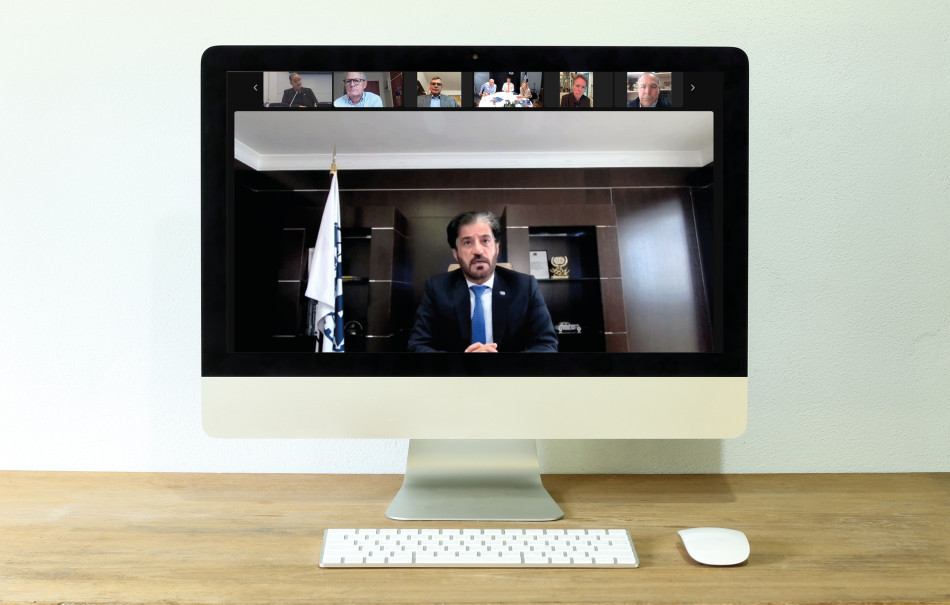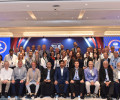WORLD COUNCIL FOR AUTOMOBILE MOBILITY AND TOURISM DEFINES NEW PATHWAYS FOR A BETTER MOBILITY FUTURE

On 29 September, the World Council for Automobile Mobility and Tourism (WCAMT) met to discuss strategic orientations for FIA Mobility over the next three years and make progress on developing effective programmes and services to better respond to FIA Members’ evolving needs and recognise their successes.

FIA President Mohammed Ben Sulayem introduced the meeting of the highest decision-making body of the Mobility pillar of the FIA by greeting members and welcoming Natalie Robyn who will soon take the position of FIA Chief Executive Officer and who was attending the World Council for the first time. He then highlighted the creation of a new initiative in line with the FIA’s commitment to build upon its collective power to drive societal transformation and honour the achievements of its Members in that endeavour.
"There are many Member Clubs whose outstanding work is bringing positive change to the FIA community and wider society. During the Annual General Assembly, we will publicly recognise their contribution in the areas of climate action, road safety, and equality, diversity and inclusion with three President’s Awards,” he said.
Open to all FIA Member Organisations, the Awards will be given to impactful projects or activities in the fields of Equality, Diversity and Inclusion (EDI); Environmental Sustainability (Climate Action); and Road Safety.
During the FIA Annual General Assembly in Bologna, awardees will receive public recognition for their outstanding commitment and contributions to the achievement of the global Sustainable Development Goals which are central to the FIA’s core mission. In addition, all submitted projects will be given visibility on the FIA platforms. Such acknowledgment will act as a catalyst for other initiatives around the world, and incentivise Member Clubs to join a collective movement that will spark new, innovative and visionary ideas, inspire the FIA community, and change mindsets.
FIA Deputy President for Automobile Mobility and Tourism Tim Shearman outlined the novelty brought by the initiative. “The key takeaways are really to expand the scope of the three areas and also the fact that submissions will gain recognition and exposure even if they are not the winning ones and I think this is a great evolution and a great opportunity for Mobility Clubs to show their innovation,” he explained.
The WCAMT members welcomed the creation of these Awards and invited all FIA Members to apply before the 15 October deadline.
Another highlight of today’s meeting was the presentation of the draft FIA Mobility Strategy 2022-2025 articulated around a vision — to make the FIA a global leader for safe and sustainable mobility — and a mission — to serve FIA Members and keep people moving, safely and dynamically.
The document defines four strategic objectives for the FIA action in mobility by 2025: to transform the FIA into a knowledge-led federation; to develop stronger Regions and Clubs; to be a global leader in sustainable mobility; and to be a diverse, inclusive and socially responsible federation.
These objectives will serve as a guiding framework to develop future initiatives that assert the position of the FIA on the international scene and engage youth, as well as to reinforce FIA Mobility’s core Member services and programmes related to training, capacity building, advocacy, support for regional and local projects, and the promotion of best practice sharing. To ensure these objectives are met, the strategy defines four engagement streams: ‘Global Voice’; ‘Regional Projects’; ‘Global Projects’; and ‘Member Club Development’.
The WCAMT members noted the developments made and the thorough review done by the FIA Mobility Division to shape these new orientations in consultation with the FIA Mobility Regions, the FIA Mobility Commissions, and the FIA Mobility Programmes Committee. Consultations will continue to refine and finalise the strategy which will be submitted to the next World Council meeting in December for final approval.
Strongly committed to make roads safer for all, the WCAMT was also kept abreast of recent developments related to FIA programmes in the field of safe mobility. WCAMT was informed about the launch of the Delft University Advocacy Training programme that aims to respond to the FIA Member Clubs’ demand for the FIA to build capacity by providing road safety and public policy training.
The WCAMT members were also presented with the roadmap for the rollout of the FIA Road Safety Index. This new Index provides a methodology to assess the road safety performance and calculate the road safety footprint of organisations and companies relying on a similar concept as the carbon footprint calculator. The aim of this Index is to enable companies and organisations to build a culture of safety and offer them a systematic approach to identify, measure and follow up road safety results from a value chain perspective.
The World Council approved the proposed roadmap for deployment of the Index following the successful pilot phase of the project that involved three large companies, Autoliv, IKEA, and TotalEnergies, the Swedish transport administration Trafikverket, and two FIA Clubs, the Automobile Club Association (ACA - France) and the Automóvil Club del Uruguay (ACU). The WCAMT also encouraged FIA Members to promote the Road Safety Index and noted the opportunity for them to use the Index as a tool to assert their position as key advocates and experts in the field of road safety.
Recent developments in Membership Services were also highlighted during the meeting. The World Council heard about the progress made in the deployment of the One Road programme. This new global rewards programme will aim to harness the collective power of FIA Mobility Clubs to offer high-value benefits to their members and create new revenue streams for Clubs. By providing Clubs’ members with access to unique global loyalty offerings, One Road will offer FIA Mobility Organisations an unprecedented tool to tackle membership acquisition and retention. Members of the WCAMT welcomed the proposition to launch the pilot phase of the programme in October 2022.
Travel and Tourism Services were also on the agenda with a presentation on the positive results of the Carnet de Passages en Douane (CPD) sales this year. The FIA and AIT aggregated sales have increased by 388% between 2021 and 2022. The high visitor rate of the International Driving Permit (IDP) website was also highlighted. As an example, internationaldrivingpermit.org has seen an increase of 105% in its number of visitors from July 2021 to July 2022. The World Council noted these positive developments that translate the rebound in tourism activities and observed that many opportunities can be seized by FIA Mobility Members in that field.
Particularly committed to strengthen regional empowerment, the WCAMT heard about the selected projects and programmes from the four FIA Mobility Regions that will be supported by the FIA Club Development Programme in 2023. As part of the projects funded by the Programme in 2022, the WCAMT was presented with reports on the FIA American Congress held in Cartagena, Colombia, from 1-3 August and hosted by the Automóvil Club de Colombia, and the FIA Region II Roundtable held in Hanoi, Vietnam, from 22-23 September and co-hosted by the AA Vietnam and AIP Foundation. World Council Members noted the success of these regional events and their key role in fostering closer collaboration and best practice sharing within FIA Mobility Regions.
The next meeting of the WCAMT will take place in December in Bologna, Italy, during the FIA Annual General Assembly Week.
Note to the editors
- The World Council for Automobile Mobility and Tourism is the highest decision-making body for the Mobility pillar of the FIA, elected by the FIA General Assembly. It is comprised of 26 members including the FIA President, the FIA Deputy President for Automobile Mobility and Tourism, the four FIA Mobility Regions’ Presidents, the Region I ACTAC Subregion President, the Region I ACTA President as well as representatives from the four FIA Mobility Regions (Region I – Europe, Middle East and Africa, Region II – Asia Pacific, Region III – North America, Region IV – South America and Central America).


 Facebook
Facebook Twitter
Twitter






